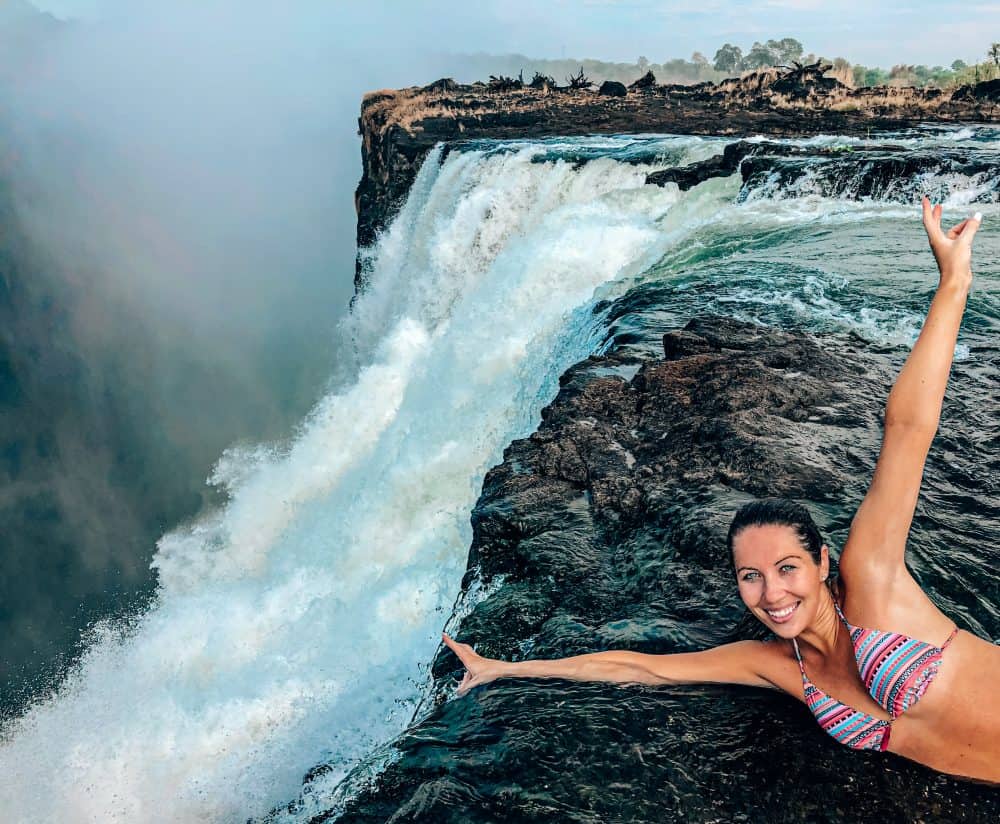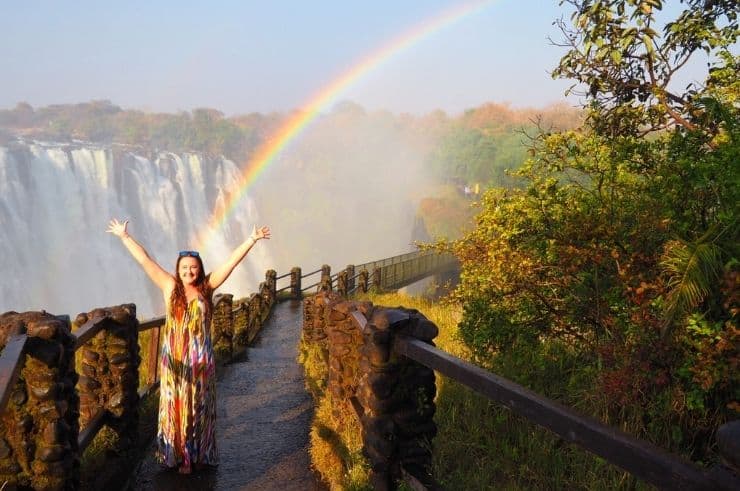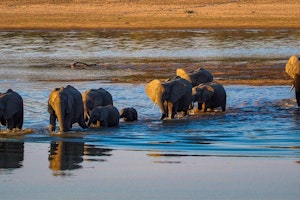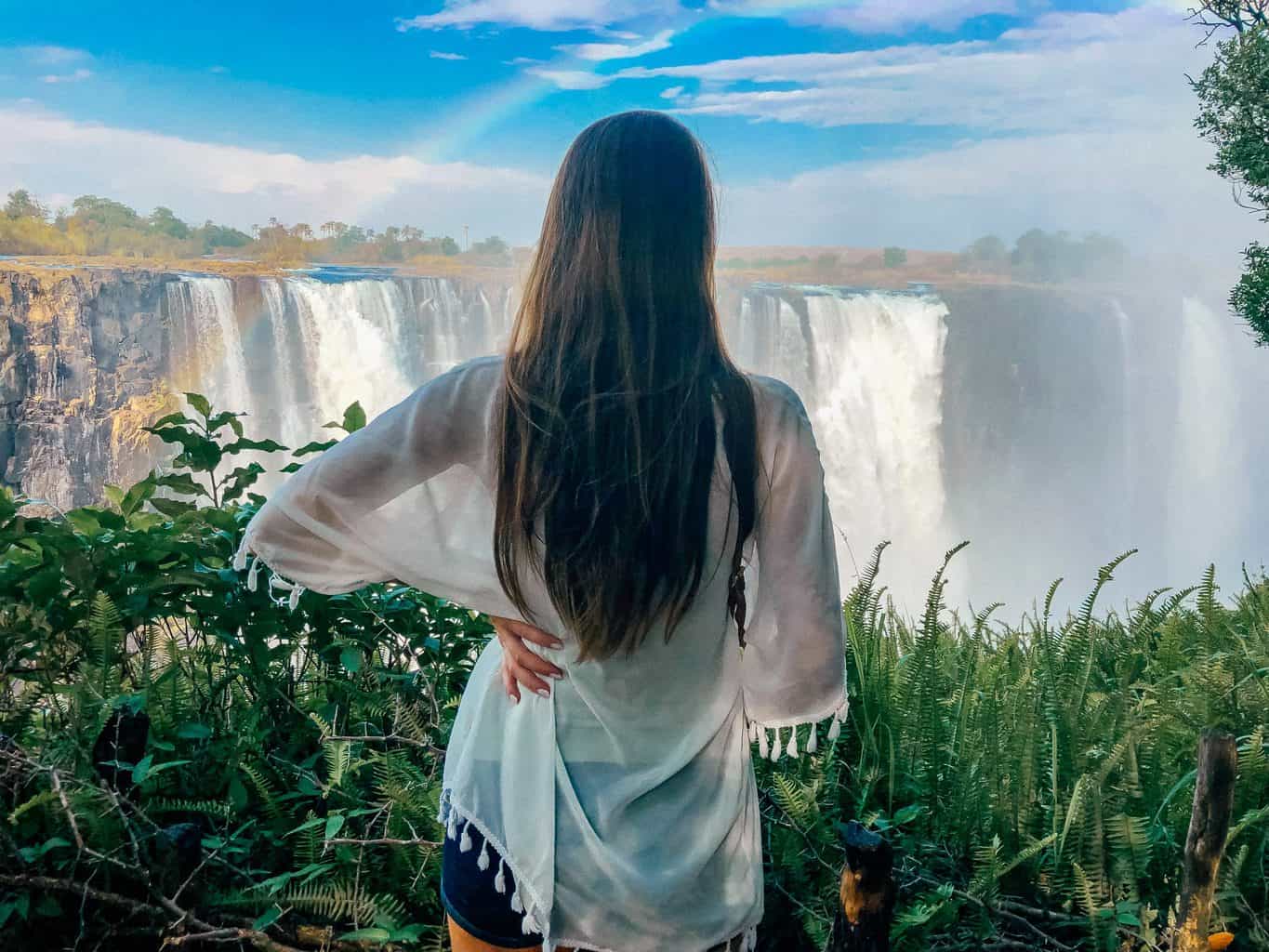A Guide to the Wonders of Zambia: What British Tourists Need to Know

Introduction
In the heart of Africa lies Zambia, a vibrant country with a rich tapestry of geography, history, and culture waiting to be explored. Let's delve into the essence of this captivating destination, starting with its diverse landscapes and the stories embedded in its past.
Geography of Zambia
- Land of Contrast: Zambia boasts a diverse geography that includes magnificent water bodies like the Zambezi River and the stunning Victoria Falls, alongside vast savannas and lush national parks.
- Wildlife Haven: Home to a plethora of wildlife, Zambia offers a unique safari experience with its abundance of elephants, lions, and hippos roaming freely.
- Natural Wonders: From the majestic Victoria Falls, known as the "Smoke that Thunders," to the tranquil waters of Lake Tanganyika, Zambia's natural beauty is awe-inspiring.
History and Culture
- Heritage Richness: Zambia's history is steeped in the traditions of various indigenous tribes, each with its own customs and practices that contribute to the country's cultural mosaic.
- Colonial Legacy: Having been under British colonial rule, Zambia bears the marks of its past struggles for independence, which have shaped its present-day ethos of resilience and unity.
- Celebrations and Festivals: Festivals like the vibrant Kuomboka ceremony of the Lozi people showcase Zambia's colourful cultural heritage and the spirit of community that defines its people.

Travel Requirements
Visa and Passport
When travelling to Zambia, ensuring you have the necessary travel documents is crucial. Here are some key points to keep in mind regarding visas and passports:
Visa:
- Most visitors require a visa to enter Zambia, which can typically be obtained upon arrival at the airport or border post.
- It's advisable to check the latest visa requirements before your trip to ensure a smooth entry process.
- The visa fees vary depending on your nationality and the type of visa you need.
Passport:
- Your passport must be valid for at least six months beyond your intended departure date from Zambia.
- Make sure you have enough blank pages in your passport for entry stamps and visas.
- Consider making copies of your passport and important travel documents in case of loss or theft.
Health and Safety Tips
Taking care of your health and safety is paramount when visiting any destination. Here are some tips specific to Zambia:
Vaccinations:
- Check with your healthcare provider or travel clinic at least a few weeks before your trip to get up-to-date on routine vaccines and any recommended vaccines for Zambia.
- Malaria is present in Zambia, so taking malaria prophylaxis is advisable.
Safety:
- Respect local customs and traditions to avoid any misunderstandings.
- Be cautious with your belongings in crowded places and be vigilant, especially at night.
- Drink bottled or purified water to avoid stomach issues.
By ensuring you have the right documents and taking necessary health precautions, you can have a safe and enjoyable trip to Zambia.

Must-See Destinations
Victoria Falls
After exploring Zambia's rich culture and wildlife, it's time to visit one of the most iconic natural wonders – Victoria Falls. Locally known as "Mosi-oa-Tunya" (the Smoke that Thunders), this breathtaking waterfall is a UNESCO World Heritage Site and one of the largest waterfalls in the world. Here's why you shouldn't miss Victoria Falls:
- Unmatched Beauty: Be prepared to be awestruck by the sheer power and beauty of the falls as millions of gallons of water cascade down the cliffs.
- Adrenaline Activities: For the adventurous souls, activities like bungee jumping, microlight flights, and white-water rafting are available.
- Spectacular Sunsets: Witnessing the sunset over the falls is a magical experience that shouldn't be missed.
- Local Culture: Explore the nearby town of Livingstone to immerse yourself in Zambian culture and interact with friendly locals.
South Luangwa National Park
For a true safari experience, South Luangwa National Park is a must-visit destination in Zambia. Known for its diverse wildlife and pristine landscapes, South Luangwa offers an authentic African safari adventure. Here's what makes it special:
- Abundant Wildlife: From elephants and hippos to leopards and lions, the park is teeming with a variety of wildlife, making it a paradise for animal lovers.
- Walking Safaris: Experience the thrill of getting up close to the animals on foot with knowledgeable guides leading you through the bush.
- Birdwatching: With over 400 bird species, South Luangwa is a birdwatcher's paradise, offering ample opportunities to spot rare and beautiful bird species.
- Night Game Drives: Discover the park's nocturnal creatures during a night game drive, where you might encounter elusive predators like leopards and hyenas.
These two destinations offer a glimpse into the natural beauty and wildlife that make Zambia a truly remarkable travel destination.
Outdoor Activities
Safari Adventures
Venturing into the wilderness of Zambia is an exhilarating experience that allows you to witness stunning wildlife up close. Safari adventures are a must-do activity for nature enthusiasts and animal lovers. Here's why you shouldn't miss out on the safari experiences in Zambia:
- Diverse Wildlife: Zambia is home to a wide variety of wildlife, including elephants, lions, leopards, and hippos. Going on a safari allows you to observe these majestic creatures in their natural habitat.
- Thrilling Game Drives: Embark on guided game drives through national parks like South Luangwa and Kafue. These drives offer the opportunity to spot rare animals and learn about the local ecosystem from knowledgeable guides.
- Night Safaris: Experience the magic of the African bush at night by going on a thrilling night safari. Witness nocturnal animals in action under the blanket of stars, creating a truly unforgettable experience.
Water Sports
In addition to safari adventures, Zambia offers an array of water sports activities for those seeking a different kind of adventure. Whether you're a water sports enthusiast or looking to try something new, Zambia has something for everyone:
- White-water Rafting: The Zambezi River provides the perfect setting for adrenaline-pumping white-water rafting excursions. Navigate through rapids and gorges for an unforgettable thrill.
- Canoeing Safaris: Explore the Zambezi River on a tranquil canoeing safari. Paddle along the water, taking in the sights and sounds of the surrounding nature.
- Fishing: Zambia is a paradise for fishing enthusiasts. Cast your line in the Zambezi or Kafue rivers and try your hand at catching tigerfish, a prized game fish in the region.
Whether you prefer the excitement of a safari or the serenity of water sports, Zambia offers a diverse range of outdoor activities to fulfil every adventurer's dream.
Local Cuisine
Traditional Zambian Dishes
When immersing yourself in the vibrant culture of Zambia, tasting traditional Zambian dishes is a must. The country's cuisine reflects a blend of indigenous flavours and influences from neighbouring regions. Here are some traditional Zambian dishes you shouldn't miss:
- Nshima: Considered Zambia's staple food, nshima is a thick maize-based porridge served with a variety of accompaniments like meats, vegetables, and sauces.
- Chikanda: Also known as African polony, chikanda is a unique dish made from wild orchid tubers, groundnuts, and spices, offering a taste that is both exotic and delicious.
- Ifisashi: A popular dish in Zambia, ifisashi consists of vegetables cooked in groundnut sauce, giving it a rich and savoury flavour.
- Zambia tilapia: As Zambia is landlocked, freshwater fish like tilapia are abundant and commonly enjoyed either grilled, fried, or stewed.
Dining Etiquette
When dining in Zambia, it's beneficial to be mindful of the following dining etiquette:
- Use your right hand: Traditionally, Zambians eat with their right hand and use their left hand for other purposes.
- Respect elders: Show respect to elders by allowing them to start eating first.
- Try local dishes: Embrace the local cuisine and try traditional Zambian dishes to fully experience the culture.
- Engage in conversation: Meal times are often a social occasion in Zambia, so engage in friendly conversation with your hosts or fellow diners.
By exploring traditional Zambian dishes and observing dining etiquette, you'll not only savour the flavorful cuisine but also gain insight into the rich cultural tapestry of Zambia.

Shopping and Souvenirs
After exploring the wildlife and cultural experiences in Zambia, it's time to delve into the vibrant shopping scene and find unique souvenirs to bring back home.
Markets and Handicrafts
Zambia is a treasure trove for those who appreciate handcrafted goods and traditional artistry. Here are some highlights of what you can find in the markets and handicraft stores:
- Wooden Carvings: Admire the intricate workmanship of local artisans on beautifully carved figurines, masks, and furniture.
- Textiles: Don't miss the opportunity to purchase colourful Chitenge fabric, a versatile material used for clothing and home décor.
- Baskets and Pottery: Explore the skillfully woven baskets and pottery that showcase the rich cultural heritage of Zambia.
- Jewellery: Discover unique beadwork jewellery and accessories that make perfect gifts or souvenirs.
Buying Gemstones
Zambia is renowned for its gemstones, particularly emeralds. Here are some tips for purchasing gemstones in Zambia:
- Emeralds: Zambia produces some of the finest emeralds in the world, known for their deep green colour and exceptional clarity.
- Shopping Advice: When buying gemstones, it's important to purchase from reputable dealers to ensure authenticity and quality.
- Ethical Sourcing: Support ethical gemstone practices by choosing stones from dealers who follow sustainable and fair trade principles.
Exploring the markets and gemstone shops in Zambia is not just about shopping; it's a cultural experience that allows you to connect with the country's heritage and artisan craftsmanship.
Wildlife Conservation
Efforts in Zambia
Zambia has been making significant efforts in wildlife conservation to protect its diverse ecosystems and the animals that inhabit them. The country boasts a variety of national parks and game reserves, which are crucial for preserving its rich biodiversity. Some of the key conservation efforts in Zambia include:
- Anti-Poaching Initiatives: Zambia has been actively involved in anti-poaching efforts to combat illegal wildlife trade and protect endangered species like elephants and rhinos. Rangers are deployed to safeguard these animals from poachers.
- Community Involvement: The country recognizes the importance of local communities in conservation. Initiatives that involve community members in wildlife management and ecotourism help create a sense of ownership and responsibility towards protecting the environment.
- Wildlife Rehabilitation Centers: Zambia houses several wildlife rehabilitation centres that rescue and rehabilitate injured or orphaned animals. These centres play a crucial role in ensuring the welfare of wildlife in distress.
Responsible Tourism
Responsible tourism is vital for sustainable wildlife conservation in Zambia. Visitors can contribute to conservation efforts by adopting responsible practices when exploring the country's natural wonders. Here are some ways tourists can promote responsible tourism in Zambia:
- Supporting Conservation Projects: Visitors can contribute to wildlife conservation by supporting organizations and projects dedicated to protecting Zambia's wildlife and habitats.
- Respecting Wildlife: It's essential to observe animals from a safe distance and avoid disturbing their natural behaviour. Feel free to capture photos, but remember not to use flash photography around sensitive wildlife.
- Choosing Ethical Tour Operators: Opt for tour operators that prioritize sustainable practices and ethical wildlife encounters. Ensure that your tourism activities have minimal impact on the environment and wildlife.
By participating in responsible tourism and supporting conservation initiatives, you can play a part in preserving Zambia's natural treasures for future generations to enjoy.

Cultural Experiences
After exploring Zambia's stunning landscapes, engaging with its rich history, and indulging in delicious cuisine, delving into the country's vibrant cultural experiences is a must. This beautiful nation is home to a tapestry of tribal traditions, music, and dances that are both captivating and deeply rooted in the heritage of its people.
Tribal Traditions
Zambia is a melting pot of over 70 different ethnic groups, each with its unique customs, languages, and practices. Immersing yourself in tribal traditions offers a profound insight into the diverse tapestry of Zambian culture. Some fascinating tribal traditions to explore include:
- The Bemba Tribe: Known for their intricate beadwork and traditional ceremonies like the Ncwala festival.
- The Lozi People: Famous for their spectacular Kuomboka ceremony, where the Litunga (king) moves from the flooded plains to higher ground.
- The Ngoni Tribe: Renowned for their vibrant dances and storytelling through rhythmic performances.
Music and Dance
Music and dance are integral parts of Zambian culture, reflecting the country's history, beliefs, and celebrations. The rhythmic beats and energetic movements of traditional Zambian music and dance forms are a feast for the senses. When in Zambia, don't miss the opportunity to witness:
- Traditional Drumming: Experience the powerful beats of the drums, a fundamental element in Zambian music.
- Cultural Dances: From the energetic Chintobentobe dance to the graceful Makishi dance, each performance showcases the diversity and spirit of Zambia's cultural expressions.
By immersing yourself in tribal traditions, music, and dance in Zambia, you'll gain a deeper appreciation for the country's rich heritage and vibrant cultural tapestry.

Weather and Best Time to Visit
Climate Overview
As you plan your trip to Zambia, understanding the climate can greatly enhance your experience. Zambia's weather is typically tropical, with distinct wet and dry seasons throughout the year. Here's a brief overview to help you pack accordingly:
Dry Season (May to October):
- Pleasant temperatures and clear skies make this the ideal time for wildlife viewing and outdoor activities.
- Wildlife congregates around water sources, making it easier to spot during safaris.
- Temperature: Ranges from 77°F to 86°F (25°C to 30°C).
Wet Season (November to April):
- Lush green landscapes and baby animals are highlights of this season.
- Some roads may become impassable due to heavy rains, affecting travel plans.
- Temperature: Ranges from 68°F to 86°F (20°C to 30°C).
Peak Tourist Seasons
Zambia's peak tourist seasons coincide with the dry season, when the weather is most favourable for exploration and wildlife sightings. Here's a breakdown:
High Season (June to October):
- Ideal for safaris in national parks like South Luangwa.
- Accommodations and tours may be more expensive during this period.
- Advance booking is recommended to secure preferred accommodations.
Shoulder Seasons (May and November):
- Quieter than the high season, with more affordable rates.
- Best for travellers seeking a balance between weather conditions and budget considerations.
Understanding Zambia's climate and peak tourist seasons can help you plan a memorable and enjoyable visit to this beautiful African country. Whether you prefer wildlife adventures or cultural experiences, selecting the right time to visit can significantly enhance your trip.

Travel Tips
Currency and Payment
Travelling to Zambia means navigating through different currency and payment methods. Here's a handy guide to help you manage your finances smoothly:
- Currency: The official currency in Zambia is the Zambian Kwacha (ZMW). It's advisable to carry some cash in local currency for small purchases and areas where card payments may not be accepted.
- ATMs and Credit Cards: In urban areas like Lusaka and Livingstone, you can find ATMs that accept international cards. Credit cards are commonly accepted in hotels, upscale restaurants, and larger stores. However, it's wise to have some cash on hand for rural areas and local markets.
- Exchange Rates: Stay informed about the current exchange rates to avoid being overcharged. It's recommended to exchange money at banks or authorized bureaus for fair rates.
- Tipping: Tipping is not mandatory in Zambia, but it's a common practice to tip guides, drivers, and hotel staff if you receive good service. A tip of around 10% is appreciated.
Packing Essentials
Packing for your Zambian adventure can determine your comfort and enjoyment during the trip. Here are some essentials to consider including in your suitcase:
- Light Clothing: Zambia has a tropical climate, so pack light, breathable clothing. Don't forget a hat and sunglasses for protection from the sun.
- Insect Repellent: Due to the presence of mosquitoes, especially in the rainy season, insect repellent is crucial to prevent mosquito bites and potential diseases like malaria.
- Binoculars: If you're heading for safari adventures, a good pair of binoculars will enhance your wildlife viewing experience.
- Comfortable Shoes: Whether you're exploring Victoria Falls or trekking in national parks, comfortable and sturdy shoes are a must.
- Travel Adapter: Zambia uses Type C, Type D, and Type G plugs, so remember to pack a suitable adapter to charge your devices.
By being prepared with the right currency and packing essentials, you can have a smooth and enjoyable trip to Zambia.
